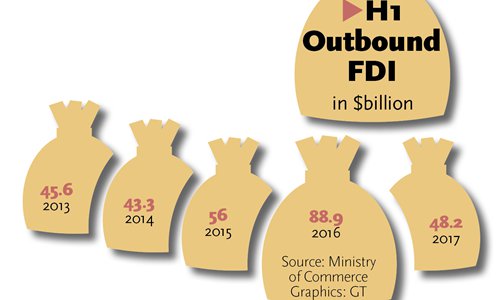 (Graphics/GT) Downward pressure to persist as investors turn 'rational': experts Chinese regulators' tightening measures aimed at controlling speculative investments in overseas markets at the end of last year might have paid off as outbound foreign direct investment (FDI) took a steep dive in the first half of the year, experts noted on Sunday. Rising uncertainty in the global markets and better-than-expected performance in the domestic market also contributed to the downfall, experts said, adding that the decline in outbound FDI would continue as investors seem to cool down and return to what is described as "rational investment." China's non-financial outbound FDI plunged 45.8 percent year-on-year in the first half of 2017 to $48.19 billion, according to data released on Thursday by the Ministry of Commerce (MOFCOM). In June alone, outbound FDI fell 11.3 percent year-on-year to $13.6 billion, the data showed. In a briefing on Thursday, Gao Feng, a spokesman for the MOFCOM, attributed the steep fall to "persistent improvements" in the Chinese economy that has boosted investors' confidence in the domestic market; rising uncertainties such as regional conflicts; and regulatory tightening on foreign investment in some countries. Gao also pointed out the effectiveness of "adjustment measures" taken by the MOFCOM and other government agencies on outbound investment at the end of last year. "Unreasonable outbound investment has been effectively curbed," he said. Several Chinese government agencies, including the MOFCOM, the State Administration of Foreign Exchange and the National Development and Reform Commission, the country's top economic planner, took a series of measures such as strict verification over large overseas deals and foreign exchange transactions in a bid to curb "unreasonable investment." Effect of tightening The government's tightening measures played a key role in the plunge of outbound FDI, according to experts. "There is no other way outbound FDI could experience such a great decline without the tightening policies," Bai Ming, a research fellow at the Chinese Academy of International Trade and Economic Cooperation under the Ministry of Commerce, told the Global Times on Sunday. Bai pointed out that though the domestic economy has maintained better-than-expected performance, only intense scrutiny could have brought the figure down "from double-digit growth last year to double-digit decline this year within such a short-period of time." China's outbound investment jumped 44.1 percent year-on-year to $170.11 billion in 2016, according to the data released by the MOFCOM in January. But that number dropped 48.8 percent year-on-year in the first quarter of 2017, immediately following the tightening measures. The trend shows that the government measures, which some viewed as being counterproductive in China's efforts to globalize its economy and its currency, are effective in curbing irrational investment, according to Jiang Yong, a research fellow at the China Institute of Contemporary International Relations. "It was just out of control. You see all these companies so eager to invest overseas. Some were seeking good overseas projects, while others simply following the trend or even just trying to move their assets overseas," Jiang told the Global Times on Sunday. "The latter actually accounts for a big portion of the total investments," he said. Trend to persist Jiang said with the regulations in place, domestic investors have returned to "rational investments," and the trend of declining outbound FDI would continue in the short term. "But it won't be so bad either. I have attended many meetings with some of the State-owned enterprises recently, and their strategy to go global has not changed, though they seemed to be more cautious now," Jiang said. And Chinese companies do need to be more cautious as they are weighing on overseas deals because uncertainties in the overseas markets are rising, experts said. "With more and more Chinese companies investing in overseas markets, foreign governments are also increasingly adopting a tough attitude toward deals involving Chinese investors, especially in key areas such as advanced manufacturing, energy and financial sectors," Bai said. Bai also pointed to the obstacles Chinese companies are facing in making foreign deals, such as the U.S. blocking a takeover of German chipmaker Aixtron by a Chinese firm. Bai predicted that the outbound FDI will continue to drop but at a slower pace. "It's a good thing. After all, we are looking for high-quality investment not just a big number," he said. |
Powered by Discuz! X3.4
© 2001-2013 Comsenz Inc.